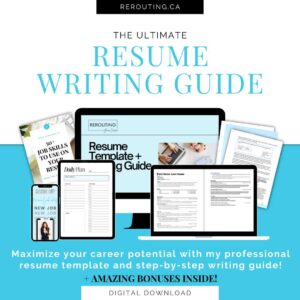
How to Stand Out at a Job Fair
Attending a job fair or a career fair can be a great opportunity to network, explore job openings, and discover organizations that would be a great place to work. Whether you are unemployed and are actively looking, or employed and want to look for other opportunities, a job fair is a great place to start. However, standing out in a sea of candidates requires strategic planning and preparation. Let’s look at what a job fair ( vs. a career fair) is and then we’ll discuss how to stand out at a job fair and network with employers. Throughout this blog post I’ll use job fair and career fair interchangeably as the basis of preparation is the same.
Disclosure: This post may contain affiliate links, meaning ReRouting Inc. gets a commission if you decide to make a purchase through links posted on this site, at no cost to you. Please read this disclosure for more info. As an Amazon Associate, I earn from qualifying purchases.
Before we get started, if you are currently looking for a job here are some other blog posts that might be helpful:
- In-Demand Careers for 2024 – Navigating the Job Landscape
- How To Optimize and Enhance Your LinkedIn Profile
- 5 Things You Need To Do Before A Video Call Job Interview
You can also search job opportunities here on my job board.
What is a Job Fair and is it Different Than a Career Fair?
A job fair is an event where multiple employers gather to meet and interact with potential candidates looking for job opportunities. It typically includes various companies from different industries, offering a range of job openings and positions. Job fairs provide candidates with the chance to learn about job opportunities, local companies who are hiring, network with recruiters, submit resumes, and sometimes even participate in on-the-spot impromptu interviews. Quite often though these interviews can be vary basic and more of a quick screen to collect a bit more information before scheduling an actual interview should the candidate seem to be a good fit.
On the other hand, a career fair can be more focused on specific industries, professions, or career paths. It may feature employers related to a particular field, such as healthcare, technology, finance, or education. Career fairs tend to occur at universities and colleges looking to help students find their path and network with potential employers. Career fairs often attract candidates who are already pursuing a career in a specific industry or are interested in transitioning into that field. These events often include workshops, panel discussions, and networking sessions tailored to the industry or career theme. The goal of career fairs is to provide attendees with an opportunity to connect with industry professionals.
Now let’s dive in to learn more about how to stand out at a job fair and network with employers. Before we can do that let’s discuss how to prepare effectively for a job fair and key strategies to be successful at a job fair and most importantly what you can do to prepare effectively for this valuable networking event.
How to Prepare for a Job Fair
Getting ready for a job fair, or a career fair, requires the same preparation. Planning ahead of the event is essential for maximizing your opportunities and making meaningful connections with potential employers. Preparation also involves researching, crafting a resume and printing out hard copies that can be left with employers, and developing key points to use in an elevator pitch to make a positive first impression.
By preparing effectively, you demonstrate your enthusiasm, readiness, and professionalism, which can significantly enhance your chances of networking successfully and landing interviews or job offers. Let’s break these down further and get more specific about how to prepare for a job fair.
1. Research Participating Companies
Before even attending the career fair, research the companies that will be attending. Often, the company or school hosting the career fair will develop a website that lists the participating employers.
Review the employer summaries and then pick a handful that you are interested in and want to further research. Visit their website to learn more about what the company does and look for their careers page to see the roles they are currently looking to fill. Familiarize yourself with their values, mission, industry, and job openings.
This knowledge will impress recruiters and demonstrate your genuine interest in their organization. Even if the company is not currently hiring for a role that matches your experience and career goals, it doesn’t hurt to visit their booth and communicate your interest in their company and provide them with a copy of your resume for future opportunities that might align with your education and experience.
2. Prepare Your Resume and Print Copies
Craft a targeted resume that highlights your relevant skills and experiences for the positions you’re interested in. If you identify different roles that you are interested in pursuing, ensure that you create targeted resumes.
For example, someone that is looking to apply for roles within a marketing department and sees two different organizations are looking to hire within their marketing dept. YaaaY!
The first company is looking to hire a Digital Marketing Strategist.
And the second company is looking to hire a Marketing Specialist.
These roles at the different companies would have different job descriptions and could likely be within different industries. You have reviewed the job openings on their website and they are requesting very different skills and experience. When you compare the two opportunities you feel you are qualified for both.
Since the jobs are different, it would be ideal to create two separate resumes (one for each company) to highlight why you are the best candidate for the job(s).
I have created a resume template and writing guide bundle to help you create a professional and targeted resume that is sure to land you job interviews if you follow my exact tips and recommendations.
3. Develop Key Points to Use in an Elevator Pitch
Prepare a compelling elevator pitch—a summary of who you are, your strengths, and what you’re looking for professionally. Practice delivering it confidently. Pro-tip, don’t try to memorize a “speech”. I find when people do this it can come off unnatural and robotic. Instead think of the main points that you want to convey and communicate them naturally as you would in a conversation when introducing yourself.
4. Dress Professionally
Dress for success by wearing professional attire that aligns with the industry and company culture you’re targeting. First impressions mean a lot when attending a job fair and can unfortunately lean a recruiter who is there representing the company in a negative way if someone shows up appearing sloppy. Dress professionally and if you don’t have professional attire and cannot afford anything, check out your local thrift store for deals.
5. Pack a Tote with These Essentials
Pack essential items such as multiple copies of your resume, a notepad and pen for taking notes, and a tote for carrying your items. Some employers will hand out swag. A bag to put these items in is helpful rather than trying to juggle them and introduce yourself with a handshake. If you’d like to invest in a professional portfolio organizer, here is my favorite one. It provides a space for your notepad, resume copies, and will hold your pen.
I have seen people attend career fairs (job fairs) with business cards – I have especially seen this at student career fairs. I am going to say that these are not needed. It is better to leave your resume with companies which outlines your information – they aren’t going to want to take notes on the business card you provide to them.
Now that we have gone through how to prepare, lets take a look at how to be successful at a job or career fair.
How to Be Successful at a Job Fair
Now that you have prepared for the job fair, you’ve got your resume(s) in hand, a notebook and pen, a tote to carry any swag, and you’ve dressed fit for the role you are trying to achieve. It’s time to start working your way through the sea of company booths (and other candidates) and start networking.
First off, if this seems a bit daunting to you then remember this, a career fair is just an opportunity to meet people and have conversations about potential job opportunities. You don’t need to be perfect. Be humble, be kind and professional, most importantly, be YOU.
I will never forget this time I was at a university career fair and saw this student standing off to this side doing what looked like a rehearsal of her elevator speech. I was working for a laboratory supply company where we were looking to hire science students for various opportunities. She was so nervous that she stood off to the side practicing her elevator speech (which was written on cue cards). Instead of waiting for her to walk over to our booth I, an introvert myself, walked over and introduced myself to her and started some small talk about the career fair.
We had a great conversation, I asked her for her resume and talked to her about her career goals. I wasn’t hiring for any roles that aligned with what she wanted. I said one thing to her that made us both laugh out loud, job fairs are a lot like speed dating. She was more relaxed and realized that she didn’t have to have a perfect speech to approach an employer.
After our conversation I watched her walk up to another booth and introduce herself to the company recruiter. She got the boost of confidence she needed to get started. I hope reading this story makes you realize that if you are feeling nervous about attending a job (career) fair, it is normal. But remember this, we are all just people. It isn’t a formal interview, it’s about making small talk and collecting more information.
Develop Your Networking Skills
Approach each interaction with confidence but don’t be cocky. Walk up to booth representatives and introduce yourself – gauge whether or not a firm handshake would be appropriate or not. Initiate conversations, ask insightful questions about the company and roles, and actively listen to the recruiters’ responses. Be prepared to discuss your background, skills, and career goals in a concise manner. As someone who sits on the other side, I don’t expect perfect speeches. I want to meet people, not robots.
Key Tip: I don’t know why this happens, but often I get candidates approaching a booth that don’t introduce themselves and have said, word for word, “what’s this company all about” as their opening line.
To reiterate, here is what you should do:
- State your name and profession (if you are a student or recent graduate) your area of study.
- If you have researched the company in advance show your knowledge of the company/ brand and identify if you had seen a job posting on their website that you are interested in. It might even be a great idea to apply to the online posting to demonstrate that you have followed their internal process.
- Elaborate on your experience and education to help demonstrate that you are qualified for the role.
- Let them know that you have applied online (if you have) and offer to leave them with a copy of your resume.
My biggest tip of all is to be warm, personable, and smile. This may be a very subjective opinion, but candidates who do this have a better chance of booking an interview then those that are just there to land any job, come off as cocky, or even pushy.
Follow Up After the Event:
After the career fair, send personalized thank-you emails to the recruiters that offered you business cards.
However, please note that there is also a chance that they aren’t handing out personal business cards at these events. I have attended many events to recruit and always provide company business postcards to candidates with either a generic email or instructions on how to apply for a role within the company.
I have only ever given out TWO (2) personal business cards at a career/job fair. Recruiters and HR folks don’t normally provide their own business cards as they don’t want to get bogged down in thank you emails or emails from pushy candidates.
In the email you send, express your appreciation for their time, reiterate your interest in the opportunities discussed, attach your resume, and any requested materials or additional information.
Stay Organized and Stay Connected
Keep track of the contacts you made, and any follow-up actions required. Use your notebook and pen to jot down:
- Companies that you’d like to follow on LinkedIn or other social media channels. Follow the company/brand. One thing to tread lightly with is connecting with all the booth attendants you have met at the career fair. Again, if they specifically state “ya, let’s connect” then it is okay to do so.
- Make note of any companies that you want to visit their website and submit an online application.
- If a recruiter gives you a specific task to do or job application process to follow – make a note.
Don’t go crazy jotting notes as you walk the room, but if someone says something very specific and leaves you instructions, make a note of it!
How to Stand Out at a Job Fair and Network with Employers
By following these tips on how to be successful at a career fair and by preparing effectively, you’ll stand out as a proactive and professional candidate. Remember, a career fair is about building rapport with people that are there representing the company/ brand they work for. It’s about building connections and opening doors to exciting career opportunities. I hope this blog post How to Stand Out at a Job Fair and Network with Employers helps you prepare for your next event.
Best of luck in your networking endeavors!





